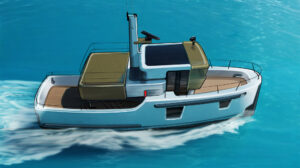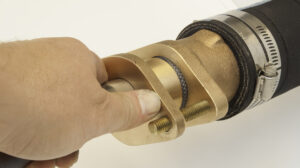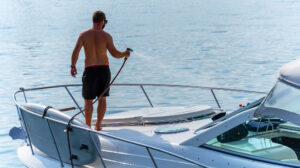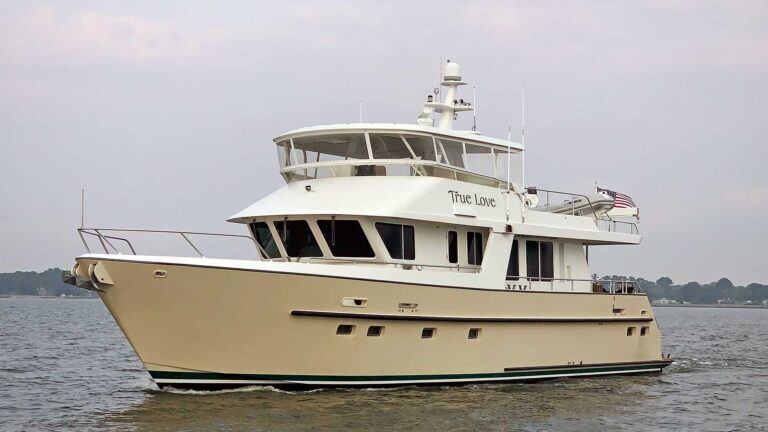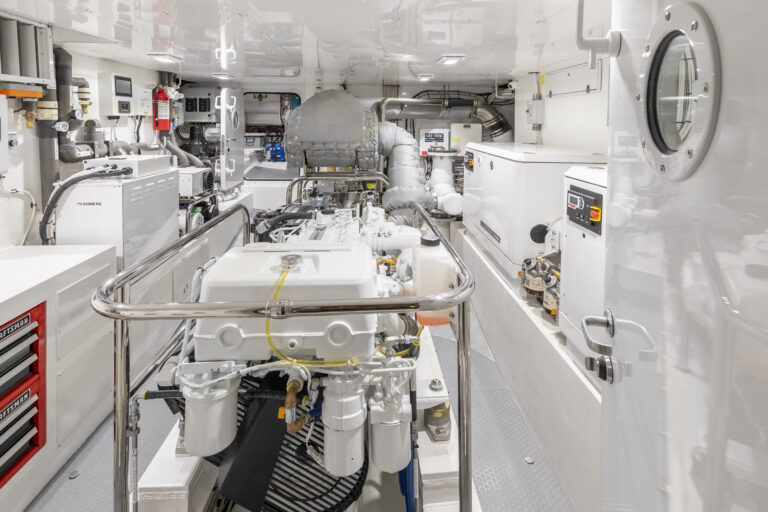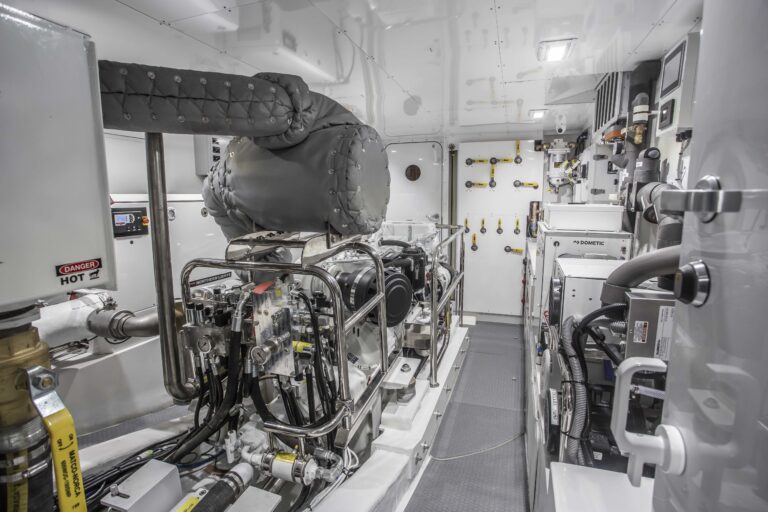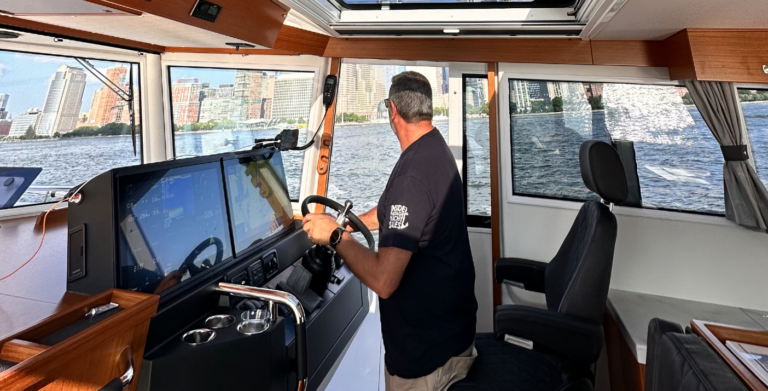Why are smoke detectors so rarely found aboard cruising vessels?
Reliable smoke detector technology has been around for decades. Much like their subsequently released carbon monoxide detector brethren, early smoke detectors went through a growing pain phase where false alarms were so frequent users tended to disable or remove them. Fortunately, those issues were soon resolved and today, for less than it costs to fill up a Prius, you can enjoy the protection of a smoke detector. Putting it in plain terms, you’d be foolish to pass up this invaluable and inexpensive protection for yourself, your family, or guests as you travel, spend time, and sleep aboard your vessel.
The value of the protection a smoke detector provides is self-evident. Smoke nearly always precedes fire and aboard a cruising vessel fire, along with flooding, is easily classified as among the worst of worst case scenarios. Early detection is the key to avoiding disaster in both cases; however, the consequences are certainly more dire where smoke and fire are concerned. If your vessel goes down you can don a life jacket and, hopefully, crawl into a liferaft. Few vessels, however, are equipped with fire retardant suits or breathing apparatus. A smoke detector, therefore, becomes the first and possibly most important line of defense in dealing with dangers of flame as well as the toxic smoke it’s almost certain to cause when modern boat-building materials burn. Interestingly, it’s also likely to be the least expensive. Once a fire takes hold, fire extinguishers, both portable and fixed, become the next option, one that you’ll want to avoid at all costs. Virtually every fire extinguisher, even the smallest economy models, cost more than most smoke detectors. You get the point, smoke detectors are cheap insurance.
Selection
As previously mentioned, an investment in smoke detectors for your vessel is very likely to be a small one. Fixed, hard-wired, central station-type smoke, flame, and heat detector systems for cruising vessels are of course more costly. They do, however, afford greater protection, notification, and versatility. Several manufacturers offer such systems; when I visited and wrote about Sea-Fire a few years ago I discussed their integrated FireStop system in which, among other things, heat, smoke, and carbon monoxide are all monitored in order to alert the crew to the presence of a fire or the precursor to one. If you are willing to pay for a hard-wired, integrated system of this sort I believe it, too, can be justified, however, even simple, inexpensive battery-powered smoke detectors purchased at home improvement stores or via the internet will give you a tremendous edge should a fire start.
The Coast Guard, relying on the Code of Federal Regulations, chapter 46 guidelines, has required that smoke alarms be installed in the sleeping compartments of small inspected vessels (vessels that carry paying passengers) for several years. Regrettably, no such requirement exists for recreational craft, however, that’s no reason to forgo a smoke detector. After all, there’s no requirement that mandates installation of electric bilge pumps, but few cruising vessel skippers would dream of putting to sea without them.
If the CG inspected vessel guideline is followed, then a smoke detector that meets Underwriters Laboratories standard UL217RV is suitable for use aboard your vessel. The National Fire Protection Association document NFPA 302 “Fire Protection Standard for Pleasure and Motorcraft” calls for adherence to the same UL standard, #217, in vessels over 26 feet. I’d say any vessel with a cabin that you could sleep in regardless of size should be equipped with a smoke detector. Interestingly, this standard is designed for recreational vehicles, or RVs, not boats. However, its testing criteria are surprisingly stringent. They include high humidity, temperature extremes, and salt spray for extended duration, etc.
Somewhat of a controversy exists within recreational marine standard-setting circles as to whether RV-approved smoke detectors are appropriate for use aboard small craft. I’ll spare the reader the details of this ongoing discussion. The controversy and whether an RV standard is appropriate is, in my opinion, not as important as giving cruisers the edge over smoke and flame. What is important is that you not cruise aboard a vessel that lacks smoke detection devices, even if they don’t meet the more stringent UL 217 marine or RV test requirements. Thus far, no smoke detector has been submitted for UL 217 marine testing, so the point is moot, for now.
The fact is, most battery powered, self-contained household smoke detectors have a useful life of between eight and ten years. Higher quality units alert you when this ten-year timeline is nearing its end, referred to as “end of life warning.” For marine use I’d use a 50-percent safety margin and enact replacement on a five-year cycle. Again, for the cost of the units this is still the cheapest smoke detection and fire safety insurance you can buy.
Use of units that don’t meet the UL 217 standard is not prohibited and in many cases units that don’t meet this standard have highly desirable features that simply cry out for use aboard a cruising vessel. Two such units, offered by Kidde and First Alert utilize wireless, RF technology to trigger every smoke alarm installed aboard your boat. Therefore, if the engine room-installed unit senses smoke, it sounds the alarm in units installed throughout the vessel, in the pilothouse, saloon, and berthing areas. Because the majority of fires that occur aboard recreational boats are electrical in origin, installing smoke alarms behind electrical panels, in lazarettes, and over battery banks also makes good sense. I’ve installed and recommended RF wireless units for a few years now and know of at least two occasions where the system alerted users to an impending engine room fire long before it would have otherwise been noticed or became critical.
If you choose to use a UL 217 RV-approved model these, too, are available. One manufacturer whose products I’ve used with satisfaction is MTI; their UL-approved battery-operated unit is compact and comes with a five-year warranty. Whichever units you choose, be sure to install one on both sides of every door in all berthing areas. That is, in the passageway outside a cabin door as well as inside the cabin. With this approach it becomes unlikely that a closed door could prevent an alarm from sensing smoke and sounding the alarm.
For years I’ve advocated the installation of proprietary marine, hard-wired carbon monoxide detectors over battery powered household units. The reason for this recommendation is twofold. First, using a function called time weighted averaging; units designed for installation aboard boats are designed to avoid nuisance alarms caused by momentary exposure to CO. It’s a truism, anything that sounds regular false alarms is soon to be ignored, and so avoiding this scenario is important. Second, because these CO detectors operate from the vessel’s own battery banks you are assured that they will be functional whenever the vessel is operational (if the batteries are dead it’s unlikely you’ll be staying aboard for very long), and there’s no danger of the internal, 9-volt battery going dead. Unfortunately, other than in the aforementioned central station or in 120-volt AC versions, hard-wired smoke alarms in the CO alarm style described above designed for marine or RV applications are not readily available. (120VAC hard-wired/9-volt internal battery/RF versions such as the model shown here, are well suited to larger vessels whose AC systems are continuously energized). Thus, we are forced, for the time being, to use the internally-powered 9-volt variety. No big deal, you might say, that’s how the household units are set up, they sound that impossible-to-ignore annoying chirp (the one in my bedroom always seems to begin sounding at 2 a.m.) for weeks when the battery begins to fail, which works just fine. However, most homeowners don’t vacate their homes for months at a time. If the battery happens to go dead while you aren’t aboard for one of those extended periods, it’s possible you’ll return to a non-functioning alarm. Therefore, until smoke alarms are offered that operate from the vessel’s own DC power, it’s critically important that you test monthly and replace batteries annually for all smoke detectors aboard.
There’s simply no good reason to forgo the installation of smoke alarms aboard your boat. My strong recommendation is to avoid spending even one more night aboard without this vital protection.



